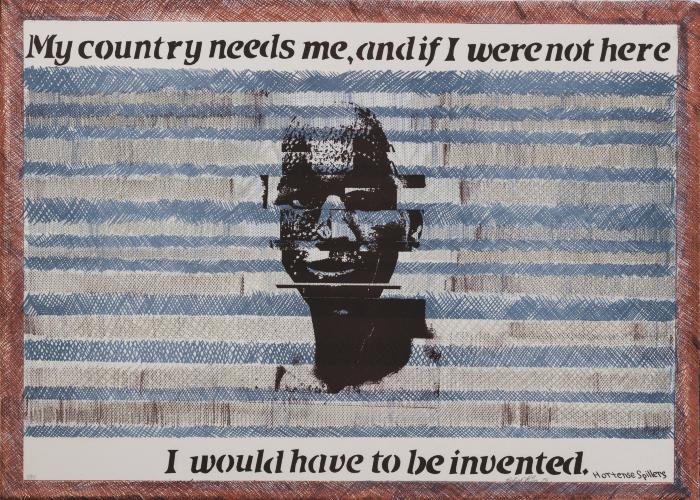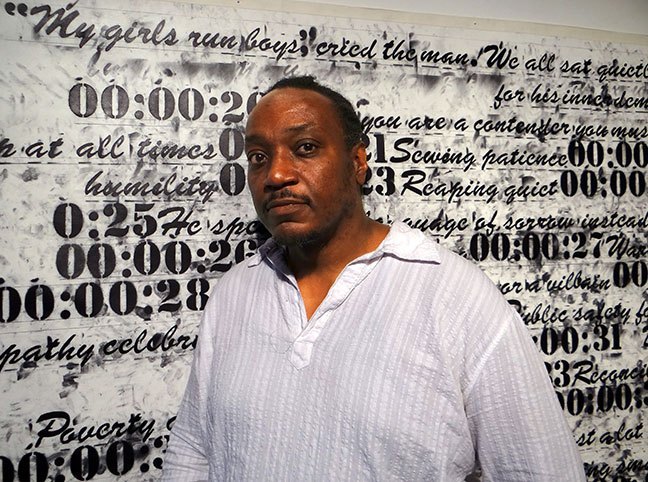
My Country Needs Me…
Rodney Ewing
- 1996
- Offset Lithograph
- Image/sheet: 29.5 x 30"
- 80 prints in this edition
About the Print
From the Artist
The idea behind the print was not only to talk about the state of the African American in United States as far as being a resource, but also trying to use the main image as a way of reclaiming and controlling an image that far too many “others” have exploited (i.e. media, history, fiction, science).
—From Brandywine Workshop and Archives records
As an artist, it is more important to create a platform that moves us past alliances, and begins a dialogue that informs, questions, and in some cases even satirizes our divisive issues. Without this type of introspection, we are in danger of having apathy rule our senses. We can easily succumb to a national mob mentality and ignore individual accounts and memories. With my work I am creating an intersection where body and place, memory and fact, are merged to reexamine human interactions and cultural conditions to create a narrative that requires us to be present and profound.
—From https://www.rodneyewing.com, accessed 6-16-2021
The quotation used in this print comes from an essay on the origins and abuse of racial and gender-based epithets, “Mama’s Baby, Papa’s Maybe: An American Grammar Book,” by African American feminist literary critic Hortense Spillers. The words, juxtaposed with a disjointed face (a combined image of a black boxer and an African mask) and a background reminiscent of an American flag, allude to the ways in which African Americans are categorized and presented, and the resulting impact on our culture.
—From https://www.philamuseum.org/collection/object/307024, accessed 6-16-2021
Rodney Ewing is a printmaker based in San Francisco, CA. He earned a BFA from Louisiana State University, Baton Rouge, and an MFA from West Virginia University, Morgantown.
Ewing’s practice focuses on intersecting the body, place, memory, and fact to reexamine human histories and cultural traditions. Ewing’s work has been exhibited at the Euphrat Museum of Art, Cupertino, CA; The Drawing Center, New York City; and The Jack Fischer Gallery, New York City. Ewing teaches at San Francisco Day School.
—From Brandywine Workshop and Archives records; bio written by TK Smith, curator
Curriculum Connections
Suggested Topics for Expressive Writing
Expressive Writing
The writings of Haki R. Madhubuti reflect a similar way of stereotyping as the word-prints of Edgar Heap of Birds. People of African descent are disproportionately represented in entertainment—as dancers and singers, particularly—and in professional sports. They are perceived as physically strong and fast. In American society, Blacks may entertain, play sports — or cook and clean. Outside of those realms, however, Blacks both with and without advanced education, social prominence, and financial success are considered dangerous, therefore representing a threatening presence at both ends of the socioeconomic spectrum.
Our abilities as viewers to understand the messages and connections that the artists hope their imagery will convey is largely based on the extent of our own experiences and information that we bring to viewing and interpreting the artwork. In many countries, these types of messages are not brought to broad public attention and are often considered subversive.
Questions to Consider
- Why are some people considered a threat while others are not?
- Why is there education inequality in most developed countries?
- Who benefits from stereotyping others?
Related Media
- “America Calling” by Haki R. Madhubuti (Don L. Lee)
- “AWARENESS” by Haki R. Madhubuti (Don L. Lee)
- “Middle Passage” by Robert Hayden
- Amistad (1997 film) directed by Steven Spielberg
- Just Mercy (2019 film) directed and written by Destin Daniel Cretton
- King in the Wilderness (2018 documentary) directed by Peter W. Kunhardt
- Committed to Memory: The Art of the Slave Ship Icon by Cheryl Finley, PhD (2018)
